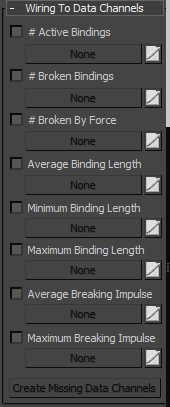Using script wiring, you can connect mParticles Glue binding parameters with data channels via the two additional rollouts: Wiring From Data Channels and Wiring To Data Channels.
To define a wired connection, check the corresponding check box on one of these rollouts, click the button below the check box, and then choose an Output New suboperator. The software lets you pick only suboperators with the proper data type, which is usually the Real type.
Interface


Wiring From Data Channels
This rollout defines the data that can be input into the mParticles Glue test.
- Bind Distance
- A Real data channel defines the Bind Distance value for a particle.
- Bind Gap
- A Real data channel defines the Bind Gap value for particle. The data from a data channel are considered only if Bind Gap (on the mParticles Glue
 Parameters rollout) is on.
Parameters rollout) is on. - Breakability Max Force
- The Real data from a data channel are considered only if Breakable By Force (on the mParticles Glue
 Parameters rollout) is on.
Parameters rollout) is on. - Breakability Max Torque
- The Real data from a data channel are considered only if Breakable By Force (on the mParticles Glue
 Parameters rollout) is on.
Parameters rollout) is on. - Max Binds p/Particle
- This integer data channel defines maximum number of bindings per particle.
- Binding Groups
- This option is not exposed on the mParticles Glue Parameters rollout. Essentially, it keeps a particle from binding to particles in a different group. A group is defined by an Output New sub-operator with an Integer payload. You set integer numbers on particles with a Data operator; then, if values match, then particles can be bound.
- Distance Binding
- The Distance Binding types use Real data channels, but the usage for each type depends on whether the binding is set to Absolute or Relative on the Distance Binding Rollout. For Absolute, the data channel values are considered as world units; for Relative, the data channels are considered as a percentage values. The range of 0 to 1 in the data channel value corresponds to a range of 0 to 100 in the Relative% parameter value.
- Minimum Distance Limit
- Maximum Distance Limit
- Spring Force Coefficient
- Spring Damper Coefficient
- Overstretch Distance Limit
Wiring To Data Channels
This rollout defines the data that can be queried from the mParticles Glue test.
Also, for Wiring To Data Channels, you needn't prepare the Output New suboperator in advance; just click the Create Missing Data Channels button to create the new data channels by the mParticles Glue operator. The procedure is similar to the creation of the new data channels in the Amount Change suboperator.
- Number of Active Bindings
- An integer data channel that indicates how many valid bindings a particle has at the moment.
- Number of Broken Bindings
- An integer data channel that indicates how many bindings were broken during the last integration step. Note: This value is not cumulative; it's for the last integration step only. If you need a cumulative value, organize your own data channel and keep adding values from this channel to it.
- Number of Bindings Broken by Force
- Applies to bindings broken by forces only, not to those broken by Maximum Distance or the mParticles Solvent operator. Like Number Of Broken Bindings, this applies to the current integration only.
- Average Binding Length
- A real data channel that contains the average length of all active bindings for each particle at the current frame.
- Minimum Binding Length
- The minimum length of all of a particle's active bindings.
- Maximum Binding Length
- The maximum length of all of a particle's active bindings.
- Average Breaking Impulse (for bindings broken by force)
- A real data channel that gives an average force value that broke a binding for each particle in the current frame.
- Maximum Breaking Impulse (for bindings broken by force)
- A real data channel that gives the maximum force value that broke a binding for each particle in the current frame.
- Create Missing Data Channels
- Click to create the channels for data generated by the mParticles Glue operator. The software gives the new data channel a default name; to rename it, click the Edit button to the right of the data channel button.